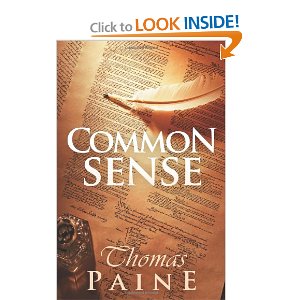Common Sense, by Thomas Paine
I know, I know…this is really a pamphlet, not a book. Still, it’s an important pamphlet, and it’s written in an English that doesn’t flow for us today, so it wasn’t like I could just float through it. I’m glad I read it. Thomas Paine’s Common Sense is a piece of American history and was the driving intellectual force that brought the masses of colonialists together to fight the British. When it was published in 1776 it was immediately a hit and became the most widely read published work in the nation. Some say that in terms of market penetration, it still is.
This is a history lovers delight. It lays bare all the good that was behind the American Revolution: the idealism, the hope, the belief in democracy, the mistrust of a monarchy, the passion for self-rule and independence. But it also touches on many of the injustices that remained in that society (and some would argue remains today). References to negroes and natives can make a reader squirm at times. Even his dismissive attitude toward non-Christian countries sounds odd today (for some reason he really has it in for Turkey).
Despite the different times, this is a great thing to read. It will remind you why American revolted against the British. It will stir up feelings of patriotism in a good, healthy way. And it will bring alive the energy and incredible moment of beginning for the great American experiment.
By the way, the edition I have includes the Appendix that was not part of the original edition. Be sure to get a copy with the Appendix because it’s truly fascinating. Paine takes on the Quakers who opposed the war. I love his ending line with his own italics, “And here without anger or resentment I bid you farewell. Sincerely wishing, that as men and Christians, ye may always fully and uninterruptedly enjoy every civil and religious right; and be, in your turn, the means of securing it to others; but that the example which ye have unwisely set, of mingling religion with politics, may be disavowed and reprobated by every inhabitant of America.”

